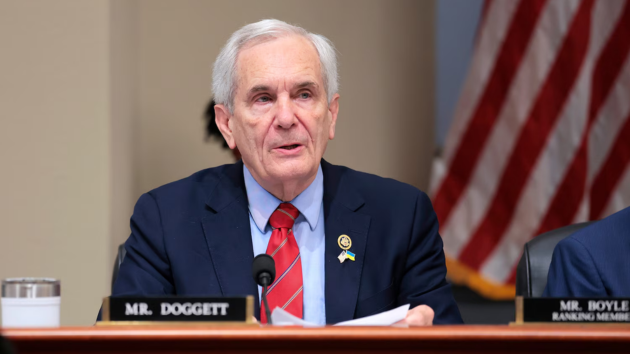
(TEXAS) — New congressional maps were proposed by Republican state legislators in Texas on Wednesday, following a push by President Donald Trump for maps more favorable to Republicans to help the GOP keep the majority in the U.S. House in 2026.
The maps come as Texas lawmakers continue meeting for a special legislative session called for by GOP Gov. Greg Abbott, who set an agenda that included considering congressional district redistricting “in light of Constitutional concerns raised by the U.S. Department of Justice.”
Trump has said he wants Republicans to pick up five new seats in Texas and others elsewhere; Democrats have decried the maneuver and said it risks hurting minority voters. Blue-state governors have said they’re considering mid-decade redistricting in response.
The state legislative bill that contains the maps, filed by Republican Texas state Rep. Todd Hunter on Wednesday morning, says it would supersede “all previous enactments or orders adopting congressional districts for the State of Texas” and would take effect first in the 2026 primary and general elections – meaning that if adopted successfully, it would impact the 2026 midterms.
The new map could net Republicans between three and five seats if enacted, analysts told ABC News.
David Wasserman, senior editor and elections analyst for The Cook Political Report, told ABC News that three of the seats in the map, he said, have been fully redrawn to favor Republicans, while two in south Texas that are currently held by Democratic Representatives Henry Cuellar and Vincente Gonzalez may still be feasible for Democrats to hold onto.
More broadly, Wasserman pointed to how Republicans made inroads among Hispanic voters in 2024 and that the map reflects how they likely assume those changes will be durable. “Republicans have very little to lose here, because this map doesn’t really weaken any of their own incumbents,” he said.
Republicans won a narrow three-seat majority last November and currently hold 219 seats to Democrats’ 212. Currently, four are vacant.
The Texas congressional delegation currently has 25 Republican House members and 12 Democratic House members. (One seat, formerly held by Democratic U.S. Rep. Sylvester Turner, has been vacant since he died in March.)
While any details of the bill and map plan could change in committee meetings, state House floor debate, or after future litigation, the current proposal shows that multiple Democratic members could be made more vulnerable.
Some of those are among five sets of members from opposing parties being redistricted into the same district; and two Democrats – U.S. Reps. Greg Casar and Rep. Lloyd Doggett – would be redistricted into the same district.
(These members could run in different districts, retire from the House, or run for a different office – there’s no guarantee they’ll face each other if the map goes through.)
There is no set timing for specifically when the bill needs to go through the motions in the legislature, but the special legislative session, which began July 21st, can only last 30 days and thus ends August 20. Gov. Greg Abbott could call for further special sessions.
Republicans hold majorities in both chambers of the Texas legislature, as well as on both the House and Senate special session redistricting committees.
One major Republican voice appears to be giving support to the endeavor.
Vice President JD Vance, in a since-deleted tweet, criticized how most of the districts in Democratic-dominated California are not Republican even though four-tenths of voters in the state vote Republican. (Trump received almost 40% of the vote in California in 2024.) “Every GOP-controlled state should be following the Texas example,” he added.
In a subsequent tweet, Vance removed the reference to Texas and simply wrote after discussing the Republican vote in California, “How can this possibly be allowed?”
Legislative Democrats have said they’re keeping their options open as to how they might respond to any new maps. Multiple Texas state Democrats have said they would consider walking out of the special session or helping break quorum to delay or stymie efforts by legislative Republicans, but they would need 51 Democrats to break quorum and would accrue financial penalties.
Some of the members of Congress potentially affected by the new map slammed it as a power grab by Republicans.
U.S. Rep. Greg Casar, criticizing how the state’s 35th and 37th congressional districts effectively get merged in the new map, wrote, “By merging our Central Texas districts, Trump wants to commit yet another crime — this time, against Texas voters and against Martin Luther King’s Voting Rights Act of 1965. United, we will fight back with everything we’ve got.”
In a statement to ABC News, former Attorney General Eric Holder slammed efforts to redistrict in Texas, and says he doesn’t oppose Democratic efforts to fight back.
Holder runs the National Democratic Redistricting Committee.
“In this moment steps must be taken to respond to the authoritarian measures being considered in certain states and now so brazenly taken in Texas,” said Holder.
Copyright © 2025, ABC Audio. All rights reserved.




